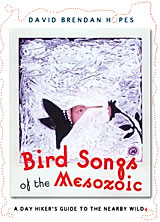 |
“The closest I’ve come in recent times to expeditions into the wilderness are day hikes off the Blue Ridge Parkway or hours of stealth on the herony banks of Beaver Lake, a ten-minute walk from my front door,” says local author David Brendan Hopes in his latest book, Bird Songs of the Mesozoic: A Day Hiker’s Guide to the Nearby Wilderness (Milkweed Editions, 2005).
“I’ve always hated the subtitle,” Hopes divulges in a recent interview, only adding to the mystique of this book, which presents itself as a tome on the natural world and its author as a reluctant naturalist.
Both of those impressions are wrong.
Seeing the trees for the forest
Hopes, who writes fiction and poetry and also paints, acts, sings and teaches, quickly reveals himself to be an astute observer of a very intricate and personal wilderness. “This book is about the portion of nature I see around me, the dragonflies that buzz into my studio, the opossum cornered in the garage, the cats asleep on the desk impeding my progress even now as I write,” he offers.
Bird Songs of the Mesozoic (the name is borrowed from a Massachusetts-based instrumental ensemble) is just that: the part of nature we all see, without venturing to the Galapagos, or even much further afield than our back door. It’s the microcosm of hornets, mantises, rose bushes and sudden storms that most of us take so much for granted they’re rendered invisible.
“I’ve worked on occasion as a Parks Naturalist, but beyond that I have no background in nature writing,” the author concedes during our talk. In fact, his “qualifications” include little more than an artist’s sense of color, a hiker’s love of the outdoors, childhood lessons in his grandmother’s garden — and bad eyesight.
“I look at what I can see,” Hopes points out. “I think that’s given me an interest in specifics.” Like a reverse Monet, “I see the trees and then force myself to see the forest,” he says.
“From this perspective, the patch of late summer blossoms becomes a golden city, tall, branched, mobile, thronged at the top by the glitter and hurry of insects,” Hopes writes in the chapter titled “The Golden City.”
It’s this fantastic, myopic world that Hopes brings to the reader. Everyday sights and sounds are transformed into poetry, and the earthy palette is supercharged. Think of it as John Muir meets A Midsummer Night’s Dream — on ecstasy.
Really deep ecology
Colors dance against the imagination — jade and malachite replace humdrum green. Bats are cinnamon, copper, mahogany. The sky ranges from Dutch blue to green-gray. And, as the “Golden” chapter indicates, there’s no shortage of that warm, rich hue.
Belying his own advice to stick close to home, Hopes ventures to Alaska, stalks a wild cat, and then, back in Asheville, battles a ferocious colony of ants.
“The editor wanted to drop the ants piece because I was supposed to be writing about nature and being all cuddly with the [house]cats,” the author explains of “The Anniversary.”
Initially about Karen Styles, murdered in 1994 at Bent Creek, the essay veers into Hopes’ own murderous inclinations as he deals with pests in his yard. “I spend a long time watching the ants although, if the truth be told, I hate them,” he writes.
And though the ant story and the reflections on Styles’ death weren’t originally written as one piece, in crafting Mesozoic, Hopes saw the correlation.
He also sees humor in the situation — the one happening in his yard, at least. “I haven’t been attacked by a bear or eaten by a shark yet,” the writer deadpans, “so it has to be ants.”
The accidental naturalist
Mesozoic is not a how-to guide for hikers. It’s not a trail map or a plant-identification book. Instead, these loosely grouped essays provide an insider’s perspective on the parts of nature than no amount of landscaping and lawn mowing can keep back.
Hopes, who includes narratives from his travels to Princeton, W.V.; Sligo, Ireland; and Anchorage, Alaska, makes the point that a nature enthusiast need not go as far as the Amazon (or even Ireland or Alaska) to take in exceptional scenery.
“I was at the Cliffs of Moher,” he recalls of a trip to Western Ireland’s dramatically plunging bluffs, “and behind me there was this beautiful field. I realized I was enjoying looking at the field as much as the cliffs.”
He continues, “By walking with blinders on, you’re just wasting most of your time. Not everyone can go to the Amazon. I had been seeing spectacular places all along, but I’d just assumed the places I hadn’t seen were the better ones.”
Even with this revelation — and a third nature book in the works (not to mention a new novel on the way) — Hopes remains a reluctant spokesman for the great outdoors.
“In some ways it’s fraudulent: I don’t live in a cabin or run with the wolves,” he quips, adding, “I hope this gives everyone some sort of faith in their own powers of observation. Everyone can write their own version of this book.”
David Hopes will read from Bird Songs of the Mesozoic at Accent on Books (854 Merrimon Ave.) on Friday, April 22. 4 p.m. Free. 252-6255.


Before you comment
The comments section is here to provide a platform for civil dialogue on the issues we face together as a local community. Xpress is committed to offering this platform for all voices, but when the tone of the discussion gets nasty or strays off topic, we believe many people choose not to participate. Xpress editors are determined to moderate comments to ensure a constructive interchange is maintained. All comments judged not to be in keeping with the spirit of civil discourse will be removed and repeat violators will be banned. See here for our terms of service. Thank you for being part of this effort to promote respectful discussion.